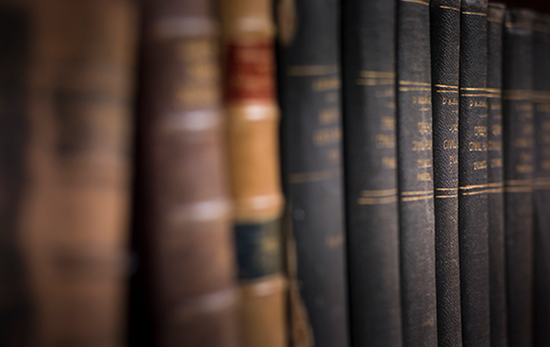
April-May 2018
Soccer and the Gospel
------------------
|






Preserving Free Will Baptist History
By Phillip T. Morgan
Since 1963, the Historical Commission of the National Association has been charged with preserving and promoting the history of the denomination. One key aspect of this task is the Historical Collection housed at Welch College. This collection contains a wide variety of records well-organized for researchers to access with ease. However, this process also relies on the faithful help of people throughout the denomination. When everyone takes part, the commission is best able to fulfill its task.
Records Free Will Baptists Create
Free Will Baptists have created many formal records since migrating to America in 1684. Records preserve the ideas and actions of people beyond the moment. Every culture creates records, even non-literate oral cultures. However, oral cultures can only preserve information through memory, which relies on interpersonal communication and is prone to deterioration. Written records are much more reliable.
Though we live in a literate society, Free Will Baptists in the southern Palmer Movement did not create many written records before the 20th century. In addition, many southern records were lost or destroyed during the Civil War and its aftermath. During the 20th century, however, Free Will Baptists have produced many more written records, especially after forming the National Association in 1935.
Some of the gaps in our records could be filled by oral histories. Older Free Will Baptists hold memories of many events and may be able to recount stories heard as young people from their elders. In fact, an octogenarian today still could hold second-hand oral knowledge from the 19th century. While this information is prone to mistakes and memory loss, few other sources remain. Interviewing these aged saints and committing their responses to video or audio recording or written transcription is an invaluable resource for historians.
Beyond memory and oral traditions, Free Will Baptists also have many written and social records. Social records are especially important for Free Will Baptist historians. Social records contain information about the actions and events of social bodies, such as religious organizations, political organizations, or social groups. Primarily, these include minutes and periodicals for churches, associations, and ministries. Pamphlets and books detail the actions and events of various people and organizations. Even bulletins, flyers, photographs, posters, promotional materials, and other printed every-day materials (broadly known as realia) from special events contain valuable information.
Social records are one of the primary forms preserved at the Historical Collection. It is our ongoing goal to collect all Free Will Baptist periodicals and associational minutes. The collection is on the mailing lists of most Free Will Baptist periodicals, and some associational clerks regularly send old and new minutes. However, many gaps still exist in these records, and both clergy and laypeople provide an invaluable service in helping us gather these materials. We also require their help collecting books, pamphlets, photographs, and all other realia.
Instrumental and legal records are also a primary concern for the collection. Instrumental records hold information designed for a specific task, such as defining the beliefs and practices of a Free Will Baptist organization (treatises, statements of faith, and church covenants), analytically addressing some aspect of Free Will Baptist theology or doctrine, instructing in spiritual growth (by a Free Will Baptist author), and research data on Free Will Baptists. The vast majority of legal records created by churches and associations are charters filed with the government. At times, however, Free Will Baptists have become embroiled in more complex legal matters that produced reams of records. The collection preserves these types of documents (depending on the importance of the legal proceeding to the denomination as a whole).
Individuals also preserve personal information that can be incidental (birth, marriage, and death records), extemporaneous (diaries and journals), or reflective (memoirs and autobiographies). These personal documents also take the form of interpersonal communications—letters, emails, and audio or visual recordings. The Historical Collection preserves these personal records from people who have had significant influence on the denomination.
How the Historical Collection Preserves Records
Preserving documents is an intentional and surprisingly complex endeavor. Determining what to keep is difficult. Records must be catalogued so researchers can locate them easily. Finally, archivists take special care to preserve records from deterioration.
Generally, the collection’s purpose is to preserve “anything published or preserved by, for, or about Free Will Baptists.” However, the limits of space, time, money, and manpower make it impossible to preserve everything. Instead, we limit the number of copies of any record, and preserve only items important for research in the future.
When the collection acquires new records, they’re entered into Welch Library’s online catalog. From anywhere in the world, researchers can search the catalog by author, publisher, subject, title, or other, more technical filters. Ideally, this means they can find specific records they know exist and discover new records relating to their work. Researchers can even request scans of specific records be emailed to them when necessary, although our resources are limited, and these requests take time to fulfill.
After cataloging, records are carefully preserved in the collection. Too often, people store records in musty stacks, spare rooms, storage closets, and display cases where they are exposed to climate fluctuations, harmful sunlight, insects, and rodents. While this destruction is unintentional, it still erases the recorded memories of our denomination.
Records of all types need to be stored in an accessible, climate-controlled space reasonably secure from theft. At the collection, records are stored in archival-quality envelopes and boxes or shelved in the main room of the collection. These materials cannot be checked out of the library, and some records can only be accessed with the assistance of the archivist or a librarian. Moldy books are treated to stop their deterioration. Documents are unfolded, bent corners straightened, and rusty staples and paperclips removed so they won’t stain the paper.
Another important aspect of preservation is to provide universal access. With the help of North American Ministries and Free Will Baptist Foundation, the Historical Commission is currently scanning all minutes in the collection and uploading text-searchable PDF files to www.fwbhistory.com. This is a massive undertaking, requiring many hours of labor. We began with the minutes of the National Association and are proceeding alphabetically through the states. Currently, we’re scanning minutes from the state of Mississippi. The results are already benefiting researchers and opening new vistas of historical study.
You Can Help!
Although we occasionally seek additions to our holdings, we primarily rely on faithful donors to supply the collection with historical records. Hopefully, this brief overview will encourage others to take part in preserving our denominational memory. If you would like to help Free Will Baptists preserve our history, please consider donating materials to the Historical Collection. Donations can be mailed to the address below. For help determining which records are important for preservation or what the collection needs, contact Phillip Morgan at pmorgan@welch.edu or at Welch Library, NAFWB Historical Collection, 1045 Bison Trail, Gallatin, TN 37066.
About the Writer: Phillip T. Morgan is curator of the Free Will Baptist Historical Collection housed at Welch College in Nashville, Tennessee, where he additionally serves as History Program coordinator and professor. Phillip, His wife Megan,
and their two children Isaiah and Julia live on a small farm in Robertson County, Tennessee.
|
|

